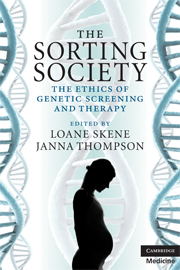Book contents
- Frontmatter
- Contents
- List of contributors
- Preface
- 1 Introduction
- 2 Genetic testing, an informed choice
- 3 Sex selection: sorting sperm as a gateway to the sorting society?
- 4 Cloning to avoid genetic disease
- 5 Procreative Beneficence: reasons to not have disabled children
- 6 Reprogenetic technologies: balancing parental procreative autonomy and social equity and justice
- 7 Genetic technology and intergenerational justice
- 8 Genetic preselection and the moral equality of individuals
- 9 Genes, identity and the ‘expressivist critique’
- 10 Overstating the biological: geneticism and essentialism in social cloning and social sex selection
- 11 The sorting society: a legal perspective
- Index
- References
10 - Overstating the biological: geneticism and essentialism in social cloning and social sex selection
Published online by Cambridge University Press: 16 September 2009
- Frontmatter
- Contents
- List of contributors
- Preface
- 1 Introduction
- 2 Genetic testing, an informed choice
- 3 Sex selection: sorting sperm as a gateway to the sorting society?
- 4 Cloning to avoid genetic disease
- 5 Procreative Beneficence: reasons to not have disabled children
- 6 Reprogenetic technologies: balancing parental procreative autonomy and social equity and justice
- 7 Genetic technology and intergenerational justice
- 8 Genetic preselection and the moral equality of individuals
- 9 Genes, identity and the ‘expressivist critique’
- 10 Overstating the biological: geneticism and essentialism in social cloning and social sex selection
- 11 The sorting society: a legal perspective
- Index
- References
Summary
Introduction
Technological expansion of our capacity directly to influence reproductive outcomes has, over the past four decades or thereabouts, significantly extended our scope for making what we are here referring to as ‘sorting’ decisions: reproductive decisions about the kinds of people to be born. A central concern of this book is with evaluating the preferences and values that govern the sorting decisions we make in the sphere of assisted procreation. Critical scrutiny of reproductive motivations is not always welcomed, due in no small part to the modern philosophical commitment to a liberal view of reproduction as falling within the private sphere of human life and decision-making. However, acceptance of the liberal view does not preclude an examination of the moral basis of procreative preferences. In so far as we seek to lead so-called ‘examined’ and autonomous lives, in which our significant motivations and preferences are ones that we are able to endorse and act upon, it is entirely appropriate that we be willing to hold ourselves to account for the preferences that influence our procreative decisions.
To that end, my aim here is to address notable critical ‘blind-spots’ in regards to two particular procreative preferences: the preference for biological relatedness, sometimes offered as an argument in favour of cloning for non-therapeutic, purely reproductive purposes (herein referred to as ‘social cloning’); and the preference for a ‘balanced family’, sometimes offered in support of non-medical sex selection (herein termed ‘social sex selection’).
- Type
- Chapter
- Information
- The Sorting SocietyThe Ethics of Genetic Screening and Therapy, pp. 133 - 148Publisher: Cambridge University PressPrint publication year: 2008
References
- 1
- Cited by

